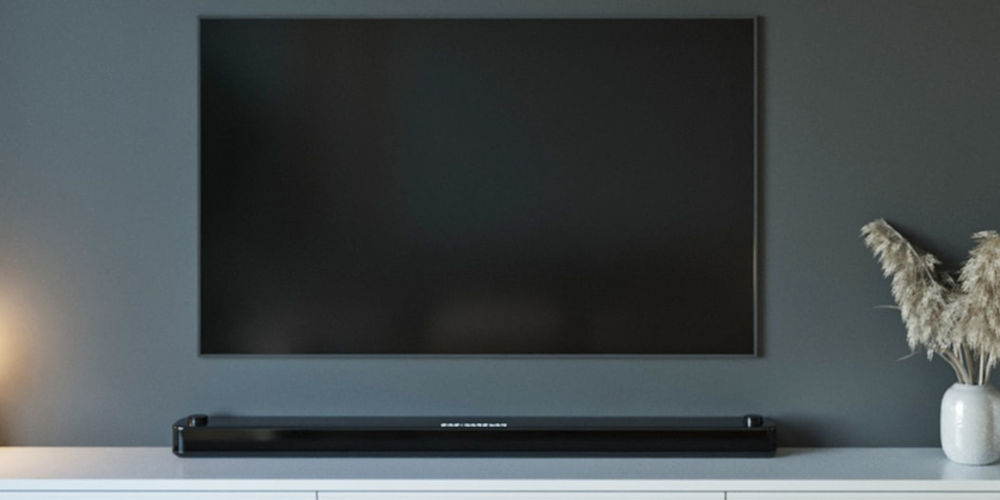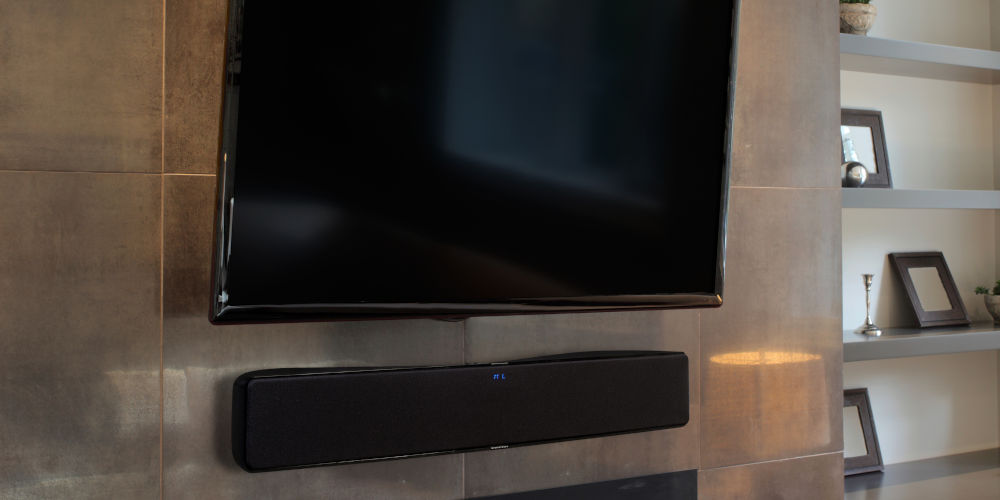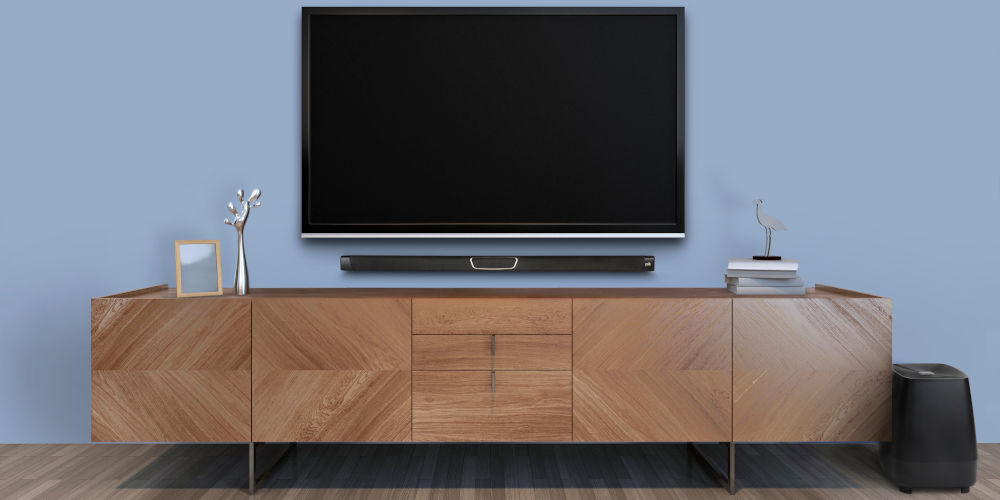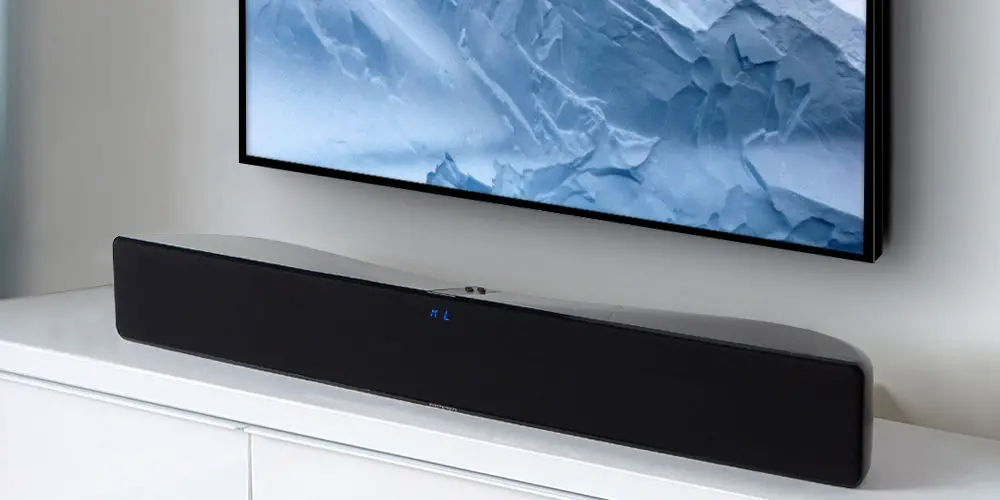What size soundbar do I need for my TV?

After investing in a 55-inch 4K TV, you decide to treat yourself to a soundbar. The poor sounding TV speakers are no match for the remarkable image quality. But, you wonder what size soundbar is ideal for the new television?
A soundbar that’s too long will look weird and might even hang off the ends of your TV unit. Too small, and it’ll also look out of place. The need to correctly size your soundbar is real!
Thankfully, by the end of this article, you’ll know exactly what size soundbar you’ll need. We’ll also cover soundbar wattage, placement and connection. So before you rush out and buy any old soundbar, you want to read this article.
Should my TV and Soundbar be the same size?
Ideally, you should buy a soundbar that matches the width of your TV. It should fit snug under your television, and not create a distraction. While that’s all well and good, there is a problem.
Soundbars are measured using the longest side as the main measurement. TVs are measured diagonally (and have always been) across the screen from the lower-left corner to the upper right. The two measurements aren’t compatible.
So you’ll need to measure your TV’s length as you would with the soundbar. By knowing the width of your TV, you can start to look for a soundbar that is the ideal length.
You don’t need a soundbar that’s exactly equal to the length of your TV, a few centimetres shorter or longer is fine. I’d argue you want a soundbar that’s slightly shorter than your TV, to allow it to effortlessly slot in underneath it, creating a more seamless look.
By matching your TV and soundbar, the sound will match the on-screen picture. Say you’re watching a movie, and a plane flies across the screen. With a small soundbar, you might not notice the sound moving from the left to the right. However, on a larger soundbar, the effect will be superb!

Has someone already calculated TV width from screen size?
If you can’t measure your TV as it’s currently on the way to you and the manufacturer only displays a screen size, then you might be a little frustrated! Of course, you could email the manufacture or ask the retailer.
Another way to calculate a TV’s width is by using the Pythagorean Theorem formula. The calculation uses screen size, and aspect ratio. If you don’t feel like doing the maths, you can use this list of the most common TV width sizes.
After you know the TV’s width, you simply need to search for a soundbar that matches. It won’t be long until you’re enjoying movies, TV and sports with your exciting new TV and soundbar!
What size soundbar do I need…?
For a 32-inch TV?
Standing at 70 cm (27.8 inches) in width, you can match 32-inch TV with a soundbar that’s between 51 and 76 cm (20 to 30 inches). There are plenty of excellent and affordable soundbars within this size range So, finding the best soundbar for your 32-inch TV shouldn’t be a problem.
For a 40-inch TV?
A 40-inch TV has a width of 88 cm (34.8 inches). So, you’ll want to buy a soundbar that’s between 76 and 101 (30 to 40 inches). Both Sony and Samsung offer some superb soundbars that are ideal for a 40-inch TV.
For a 55-inch TV?
As a 55-inch TV measures 121 cm (47.8 inches) in width, the ideal soundbar is between 101 to 127 cms (40 to 50 inches). Again, a slightly larger soundbar will be fine.
For a 60-inch plus TV?
If you have room for a 60 inch plus TV, you might want to invest in a surround sound system package like the Sony HT-S20R as it will elevate the audio to match the detailed image. Also, with such a large screen size, you’re unlikely to find an equally long soundbar.

What features are important when buying a soundbar?
Many wrongly believe, the only feature that matters is the number of watts the soundbar outputs. Most people reason, the more power it has, the better. It’s important to have plenty of volume available?! However, this misses the point.
When a manufacturer states how many watts a soundbar puts out, the figure is the maximum power output of the amplifier. Just because an amp can create 300 watts of volume, doesn’t mean you need that amount.
The speakers in the soundbar might not be designed to handle such a large volume and might blow way at a far less level. So don’t be overly impressed by the stated wattage a soundbar can deliver.
Instead of solely looking at the wattages, consider these features:
- Connections (HDMI ARC, optical, mini-jack, etc)
- Bluetooth
- Number of channels (2.1, 5.1, etc)
- Virtual Surround Sound
That said, you can’t judge a soundbar on how good the specifications are, as you need to hear in action. Unless you’re an audiophile who understands decibel ratings and speaker sensitivity, you probably want an affordable soundbar that sounds good.
Trust how the soundbar sounds
Don’t overly worry about what size soundbar you should have or if a particular model has enough watts. Instead, focus on the sound. After narrowing your choice down to a few units, compare them on sound using only your ears.
Listen for clear audio with rich bass and a touch of virtual surround sound. Try listening to music and dialogue as the soundbar you purchase should be equally good at both.
Thankfully, the majority of soundbars currently available vastly improve the sound of the average TV. Plus, any soundbar should last for several years or until you upgrade your TV and fancy a new soundbar.

What size soundbar is ideal for your TV?
When considering what size soundbar is best for your TV, use your ears, not the spec sheet. A soundbar that is bigger than the TV will look a little weird, but it might produce the ideal sound for your room’s layout and budget. Not to mention what connections your TV has.
A soundbar alone will vastly improve the sound quality compared to the built-in TV speakers. The next step is to invest in a 2.1 channel soundbar with a subwoofer package. These packages ensure you hear a rich, full sound across the frequency spectrum.
Sony, Samsung and Yamaha all offer soundbars that work with either a wireless or a wired subwoofer but aren’t a package deal. You can then buy the soundbar now and when you can afford it, purchase a subwoofer. We are fans of this approach as the system can grow with you.
If a soundbar produces a clear, rich sound and doesn’t create too much of a visual distraction, then the size probably doesn’t matter all that much. So, let your ears lead the way when deciding what size soundbar to buy.




